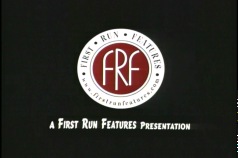 |
Just prior to my DVD purchase and viewing of a 1996 Iranian film; "Leila", by journeyman director Dariush Mehrjui, I had discussed it with two of my closest friends, who happen to be recent immigrants from Iran. Coincidentally they mentioned that just two weeks prior they had escorted the lead actress of the film (also named Leila; Leila Hatami) and her husband, around our city of residence; Toronto, Canada.
I have them to thank for my exposure and cultural knowledge that they have patiently shared with me about Iran. With a smattering of this background, it helped elevate my enjoyment and understanding of the film to a much more advanced level. |
|
|
Leila
|
||
|
"Leila" starts with a communal effort in the making of 'sholezard" pudding. Each person adding ingredients and taking turns stirring the huge fire-laden pot. The traditional dish, its preparation and the family involvement parallel prevalent themes throughout the film. In a relaxed, restrained cinematic style, reminding me very much of my favorite director Eric Rohmer, Mehrjui subtly and non-judgmentally exposes the harsh societal realities of traditional Islamic life with a backdrop of the thriving cityscape of Tehran. Filmed in dark earthy colours, this is a microscopic look at the customary and accepted oppression of females in the modern world. |
||
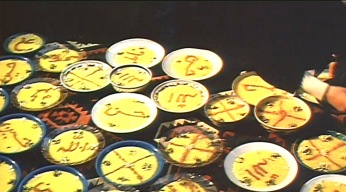 |
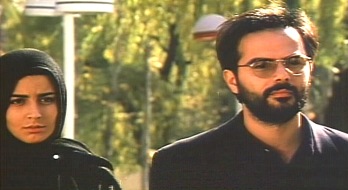 |
|
Leila and Reza are a young, cosmopolitan, married couple who are playful and loving towards each other. They find out one day the unfortunate news that Leila cannot give birth. Although she is quietly devastated, Reza is unflinchingly calm, assuring her that it is she whom he married, not her ability to breed and raise a family. But with Reza the only male sibling of his family, his mother (played by Jamileh Sheikhi) is quite adamant that he will produce an heir to carry on the family name. Leila is overbearingly persuaded by her indomitable mother-in-law that Reza is not complete nor happy, regardless of what he adamantly states, unless his seed is allowed to produces children.
Above all else, her matriarchal will-power appears the dominant force with two complacent males (both Reza and his father seem to acquiesce to the impending circumstances) and a passively pliant daughter-in-law both help adhere to the ritualistic next step; so, within the boundaries of polygamist Islamic law, Reza will now take a 2nd wife. |
||
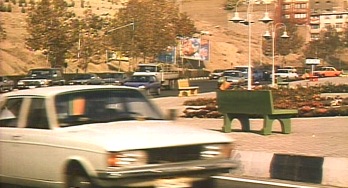 |
 |
|
|
With constant references to modernistic symbols we see one of the best parts of Mehrjui's film; how progressive accoutrements are tragically used to promote archaic traditions. With a car and the bustling freeway, Leila is brought ever closer to her husbands interviewing of the proposed second wives. It also allows her the ability to covertly view, for her required approval, the eventual number one choice. The phone is the instrument of the Mothers incessant probing and constant pressure to bend Leila to her will. It ominously rings each time the young couple enter their smartly appointed, contemporary home. |
||
 |
 |
|
|
The perfect foil for their regressed customs is the expected liberation of their lifestyles considering all the trappings of a fashioned, modern world. This discreetly exposed insanity is Mehrjui's goal, achieved with delicate perfection. What he painfully implies: How can someone who owns a cordless phone be so ineffectual to their obvious rational principals... as if living in the dark ages? It can be construed as a particularly sobering political statement as well. |
||
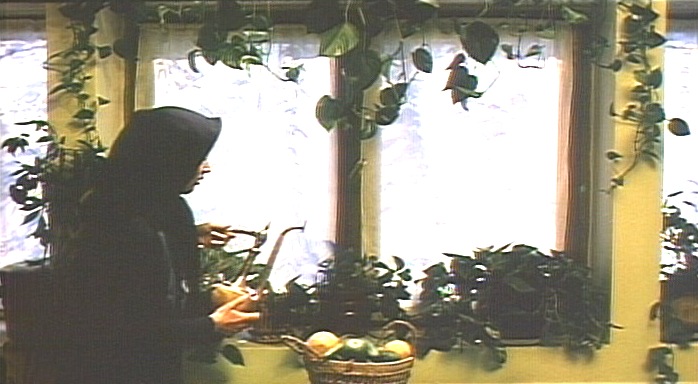 |
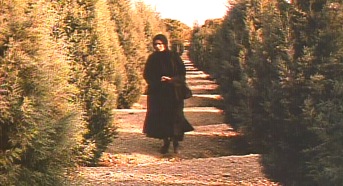 |
|
|
Mehrjui frames some marvelous shots in the film, usually set with some traditional music playing in the background. As with much cinéma vérité very little cinematographic adaptations such as tracking shots, crane shots or reverse angles are used. The background theme music is played sparingly. Even the cumbersome and concealing Muslim garb that Leila wears cannot hide her compelling and extremely attractive features. They seem to shine through even more-so with her un-cloying and restrained performance. Bravo Leila ! NOTE: Leila Hatami is actually the daughter of recently deceased Iranian director Ali Hatami (1944-1996). |
||
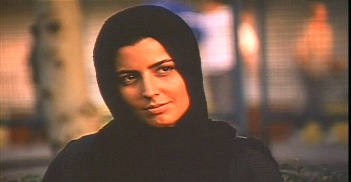 |
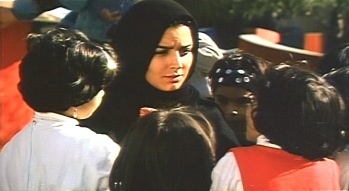 |
|
|
Do
I recommend this film?... absolutely, but with the caveat that it is not
for everyone. This is deeply personal cinema clinging to cultural
conventions that lead to a devastating and tragic storyline. I was
very moved by Leila and give it a resounding |
||
|
FILM and DVD Details |
||
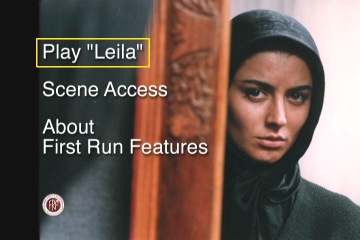 |
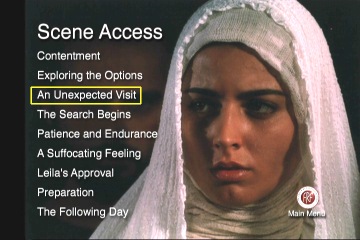 |
|
|
|
First Run Features should be commended, not for a stellar DVD, but for he distribution of this hidden gem in the first place. In Farsi with burned in English subtitles and a scratchy widescreen transfer (looks to be about 1.85:1?) this is not a perfect DVD by any stretch of the imagination. There are only 9 chapter stops over two hours of film, but on a positive note, it did give me the opportunity to see this film, of which I am extremely thankful. |
|
| Credited cast overview:
|
DVD Technical
Information
Release Information: Edition Details: DVD features include: Scene Access and Interactive Menus
|
|
